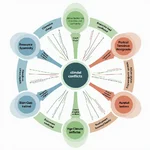Part 1: Introduction and Interview
In this section, the examiner may ask you some general questions about good news and sharing information. Here are some potential questions and sample answers:
Do you like sharing good news with others?
Band 6-7 answer:
Yes, I do enjoy sharing good news with others. It’s a nice way to spread positivity and make people happy. When something good happens to me or someone I know, I usually tell my close friends and family.
Band 8-9 answer:
Absolutely! I’m a firm believer in the power of sharing positive experiences. Disseminating good news not only uplifts the spirits of those around me but also reinforces my own sense of gratitude and joy. I find that sharing such information often creates a ripple effect of positivity in my social circle.
How do people in your country usually share good news?
Band 6-7 answer:
In my country, people usually share good news through phone calls or messages. For bigger news, they might organize small gatherings or parties to celebrate with friends and family. Social media is also becoming a popular way to announce good news.
Band 8-9 answer:
In my culture, the method of sharing good news often depends on the magnitude and nature of the information. For intimate or personal news, face-to-face communication or phone calls are preferred, as they allow for a more emotional and nuanced exchange. Social media platforms have become increasingly popular for broadcasting wider-reaching news, such as engagements or job promotions. Additionally, we have a tradition of organizing celebratory gatherings, which serve as a communal way to share and revel in positive developments.
 People sharing good news in various ways
People sharing good news in various ways
Part 2: Long Turn
Cue Card
Describe a piece of good news you heard about someone you know well.
You should say:
- Who this person is
- What the good news was
- How you found out about it
- And explain why you think it was good news for this person
Sample Answer (Band 8-9)
I’d like to share a piece of good news I recently heard about my close friend, Sarah. Sarah has been passionately pursuing her dream of becoming a published author for several years now, and just last month, she received the exciting news that her debut novel had been accepted by a renowned publishing house.
The good news was that not only had her manuscript been accepted, but she had also been offered a three-book deal, which is quite extraordinary for a first-time author. This meant that her publishers had enough faith in her writing to commit to publishing two more of her works in the future.
I found out about this momentous occasion through a video call with Sarah. It was a Saturday evening when my phone rang, and as soon as I answered, I could see Sarah’s face beaming with excitement. She could barely contain herself as she shared the news, her words tumbling out in a rush of joy and disbelief.
This news was particularly good for Sarah for several reasons. Firstly, it represented the culmination of years of hard work and dedication to her craft. Sarah had been writing since she was a teenager and had faced numerous rejections over the years, but she never gave up on her dream. Secondly, this deal provided her with financial stability and the opportunity to focus on her writing full-time, which had always been her ultimate goal. Lastly, it validated her talent and creativity in a highly competitive industry, boosting her confidence and opening doors for future opportunities.
The news was not just a personal triumph for Sarah, but it also served as an inspiration to our entire friend group. It reminded us all that with perseverance and passion, it’s possible to turn our dreams into reality, no matter how daunting they may seem.
 Author celebrating a book deal
Author celebrating a book deal
Follow-up Questions
- How did you celebrate this good news with your friend?
Band 6-7 answer:
We had a small party at Sarah’s house. Some close friends came over, and we had cake and champagne. We also gave her some small gifts to congratulate her on her success.
Band 8-9 answer:
To commemorate Sarah’s remarkable achievement, we orchestrated a surprise celebration that aligned with her passion for literature. We rented out a quaint local bookstore for an evening and organized a mock book signing event. The guests, all close friends and family, posed as fans eagerly waiting to get their books signed. We even created mock-up copies of her soon-to-be-published novel as props. The evening was filled with heartfelt speeches, literary-themed games, and a champagne toast to Sarah’s future bestsellers. This celebration not only honored her success but also gave her a taste of the author events she would soon be experiencing for real.
- Do you think it’s important to share good news with others? Why or why not?
Band 6-7 answer:
Yes, I think it’s important to share good news. It helps to spread happiness and can strengthen relationships. When we share our successes, we allow others to be part of our joy, which can be very rewarding.
Band 8-9 answer:
Absolutely, I believe sharing good news is crucial for fostering positive relationships and building a supportive community. When we share our successes, we’re not just broadcasting information; we’re inviting others to partake in our joy, which can strengthen bonds and create a sense of shared experience. Moreover, sharing good news can have a ripple effect of positivity, potentially inspiring and motivating others. It also contributes to a culture of openness and celebration, where achievements are recognized and valued. However, it’s important to strike a balance and be mindful of the context and audience when sharing good news, ensuring that our joy doesn’t inadvertently cause discomfort to others who might be going through difficult times.
Part 3: Two-way Discussion
How has technology changed the way people share news?
Band 6-7 answer:
Technology has made sharing news much faster and easier. Social media platforms like Facebook and Twitter allow people to instantly share news with a large audience. We can also use messaging apps to quickly send news to our friends and family, no matter where they are in the world.
Band 8-9 answer:
Technology has revolutionized the landscape of information sharing, creating a paradigm shift in how news, both personal and global, is disseminated. Social media platforms and instant messaging apps have democratized the process of news sharing, allowing individuals to become citizen journalists and broadcasters of their own lives. This has led to an unprecedented speed and reach in the spread of information, breaking down geographical barriers and time constraints.
However, this technological advancement is a double-edged sword. While it facilitates rapid information exchange, it also poses challenges such as the spread of misinformation and the dilution of personal connections. The ease of sharing has sometimes led to an oversaturation of information, making it difficult to discern truly significant news from trivial updates. Moreover, the digital divide still exists in many parts of the world, creating disparities in access to and sharing of information.
Despite these challenges, technology has undeniably enhanced our ability to stay connected and informed, fostering a more interconnected global community. It has also given rise to new forms of storytelling and news presentation, such as interactive infographics and live streaming, enriching the way we consume and share information.
 Technology changing news sharing methods
Technology changing news sharing methods
Do you think people share too much personal information online these days?
Band 6-7 answer:
Yes, I think many people share too much personal information online. They post about their daily activities, personal problems, and even their location. This can be dangerous because it makes them vulnerable to criminals or identity theft. People should be more careful about what they share on the internet.
Band 8-9 answer:
The question of oversharing personal information online is indeed a pressing concern in our digitally saturated age. There’s a discernible trend towards what some might call “digital exhibitionism”, where individuals feel compelled to broadcast even the most mundane aspects of their lives on social media platforms. This propensity for oversharing can be attributed to several factors, including the desire for validation, the fear of missing out, and the blurring of lines between public and private spheres in the digital realm.
While sharing personal information can foster connections and create a sense of community, excessive sharing poses significant risks. It can lead to privacy breaches, make individuals vulnerable to cybercrime and identity theft, and even impact future employment prospects or personal relationships. Moreover, the permanence of digital footprints means that shared information can have long-lasting consequences that many fail to consider in the moment.
However, it’s crucial to acknowledge that perceptions of oversharing can be subjective and culturally influenced. What one person or culture considers oversharing might be seen as normal or even expected in another context. Additionally, for some, online platforms serve as vital spaces for self-expression and community building, particularly for marginalized groups.
Ultimately, the key lies in striking a balance between authentic self-expression and prudent privacy management. This requires digital literacy education, critical thinking about the potential implications of shared content, and a more mindful approach to our online presence.
In your opinion, what kind of news do people usually like to share?
Band 6-7 answer:
People usually like to share positive news about themselves or their loved ones. This could include things like getting a new job, having a baby, or going on a nice vacation. They also tend to share interesting or shocking news stories that they think others will find important or entertaining.
Band 8-9 answer:
The nature of news that people tend to share is a fascinating reflection of human psychology and social dynamics. Generally, there’s a proclivity towards sharing news that elicits strong emotional responses, be it positive or negative.
On the positive spectrum, people are inclined to share news that bolsters their social status or reinforces their desired self-image. This could encompass personal achievements, milestones, or experiences that they believe will garner admiration or envy from their social circle. Examples include career advancements, academic accomplishments, relationship updates, or exotic travel experiences.
Conversely, there’s also a tendency to share news that provokes outrage, shock, or concern. This type of news often relates to social injustices, political controversies, or environmental issues. The motivation behind sharing such news can stem from a desire to raise awareness, spark discussion, or simply to appear informed and socially conscious.
Interestingly, research has shown that news with an element of practical utility is also frequently shared. This includes information that people believe will be helpful to others, such as health tips, life hacks, or consumer warnings.
Moreover, there’s a notable trend towards sharing news that confirms pre-existing beliefs or biases, a phenomenon known as confirmation bias. This can lead to the creation of echo chambers in social media circles.
Lastly, it’s worth noting that the virality of news often plays a role in what people choose to share. As certain stories gain traction, there’s a snowball effect where more people feel compelled to share, either to be part of the conversation or due to the fear of missing out.
Understanding these sharing patterns is crucial not only for individuals navigating the digital landscape but also for organizations and media outlets aiming to create engaging, shareable content.
Key Vocabulary and Phrases for High Scores
-
Momentous occasion [məʊ’mentəs ə’keɪʒn] (noun phrase): A very important or significant event.
Example: Graduating from university was a momentous occasion for the entire family. -
Culmination [ˌkʌlmɪ’neɪʃn] (noun): The highest or climactic point of something, especially as attained after a long time.
Example: Winning the championship was the culmination of years of hard work and dedication. -
Validate [‘vælɪdeɪt] (verb): To prove or confirm the validity or accuracy of something.
Example: The positive feedback from critics validated her decision to pursue a career in acting. -
Perseverance [ˌpɜːsɪ’vɪərəns] (noun): Persistence in doing something despite difficulty or delay in achieving success.
Example: His perseverance in the face of numerous rejections finally paid off when he secured a publishing deal. -
Orchestrate [‘ɔːkɪstreɪt] (verb): Plan or coordinate the elements of a situation to produce a desired effect.
Example: The team orchestrated a surprise party for their manager’s retirement. -
Paradigm shift [‘pærədaɪm ʃɪft] (noun phrase): A fundamental change in approach or underlying assumptions.
Example: The internet caused a paradigm shift in how businesses operate and communicate. -
Democratize [dɪ’mɒkrətaɪz] (verb): To make something accessible to everyone.
Example: Social media has democratized the process of news sharing. -
Double-edged sword [ˌdʌbl edʒd ‘sɔːd] (idiom): Something that has both positive and negative consequences.
Example: The ability to work from home is a double-edged sword, offering flexibility but potentially blurring work-life boundaries.
 Key vocabulary for IELTS Speaking
Key vocabulary for IELTS Speaking
Examiner’s Advice
To achieve a high score in the IELTS Speaking test, particularly when describing good news, consider the following tips:
-
Use a range of vocabulary: Incorporate advanced and topic-specific vocabulary naturally. Don’t just use basic words like “good” or “happy” – expand your lexicon with words like “elated,” “thrilled,” or “over the moon.”
-
Employ varied sentence structures: Mix simple, compound, and complex sentences. Use conditional statements, relative clauses, and different tenses to showcase your grammatical range.
-
Provide detailed responses: Don’t just answer the question briefly. Elaborate with examples, personal experiences, or hypothetical situations to demonstrate your ability to speak at length.
-
Use idiomatic expressions: Naturally incorporate idioms and colloquial phrases that native speakers use, but be sure to use them correctly and in the right context.
-
Maintain fluency: Practice speaking without long pauses or hesitations. It’s okay to use fillers like “well,” “you know,” or “actually” occasionally, but don’t overuse them.
-
Show critical thinking: In Part 3, especially, don’t just give surface-level answers. Analyze the question from different angles and provide balanced arguments.
-
Stay on topic: While it’s good to elaborate, make sure your answers remain relevant to the question asked.
-
Use appropriate pronunciation and intonation: Clear pronunciation and natural intonation can significantly impact your score. Practice speaking clearly and expressively.
-
Demonstrate cultural awareness: When discussing how people share news in your country, show awareness of cultural norms and practices.
-
Be confident: Even if you’re not sure about something, try to maintain a confident demeanor. It’s okay to politely ask for clarification if you don’t understand a question.
Remember, regular practice is key to improving your speaking skills. Try to immerse yourself in English-language content and practice speaking English as often as possible.


